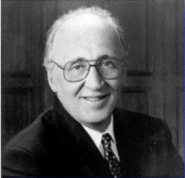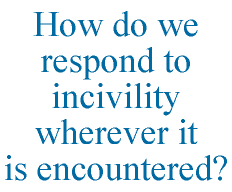Fuller Seminary President To Speak
—— Marilyn Duff
Dr.
Richard J. Mouw will share his insights
on the problem of incivility and the
Christian’s role in dealing with it.
- Several teen boys are skateboarding on a sidewalk outside a supermarket.
A woman stops to admonish them. “You’re not supposed to skate on
these sidewalks,” she says, pointing to a sign that says the same
thing. They ignore her and one whizzes by so close he brushes her purse.
- Working in his yard one weekend, a man is driven to distraction by
his neighbor’s loud radio. He shouts across the fence, “Turn that
thing down!” The neighbor responds by increasing the volume.
- A woman waits patiently in a parking lot for a car to vacate a space. Just as it’s free, another driver whips around the corner and slides into the empty spot. She yells, “Hey! I was waiting for that place!” The usurper locks his door, gives her a rude sign and walks off.
 And
this is the small stuff—the incidents of incivility that don’t make the
headlines. But ever more frequently confrontations in traffic, disagreements
in the workplace and conflicts between neighbors are escalating into physical
assault, threats with weapons and even murder.
And
this is the small stuff—the incidents of incivility that don’t make the
headlines. But ever more frequently confrontations in traffic, disagreements
in the workplace and conflicts between neighbors are escalating into physical
assault, threats with weapons and even murder.
Dr. Richard J. Mouw, author of “UNCOMMON DECENCY: Christian Civility in an Uncivil World,” will share his insights on the growing problem of incivility and the Christian’s role in dealing with it at as a featured speaker at the International Conference on Care and Kindness to be held March 15 -17, 2001, at the Crystal Cathedral in Garden Grove.
A philosopher, scholar and author, Dr. Mouw is president of Fuller Theological Seminary in Pasadena, California. He holds a B.A. in English from Houghton College, a Master’s Degree from the University of Alberta and a Ph.D. from the University of Chicago.
 Dr.
Mouw sees everyday incidents as metaphors for the larger picture of incivility.
He points to angry encounters around the world between prolifers and pro-choicers;
gay liberationists and defenders of the traditional family; artists and
legislators; ‘politically correct’ intellectuals and crusading fundamentalists;
Irish Catholics and Irish Protestants; Arabs and Jews in the Middle East.
So how do we re
Dr.
Mouw sees everyday incidents as metaphors for the larger picture of incivility.
He points to angry encounters around the world between prolifers and pro-choicers;
gay liberationists and defenders of the traditional family; artists and
legislators; ‘politically correct’ intellectuals and crusading fundamentalists;
Irish Catholics and Irish Protestants; Arabs and Jews in the Middle East.
So how do we re
So how do we respond to incivility, wherever it’s encountered? Do we smile passively and remain silent, emanating acceptance to those whose values are the opposite of ours? Do we withdraw into enclaves of Christianity—home, church and groups of Christian friends—and let the outside turmoil roll by? Or do we respond in kind like Christian “warriors,” marching in protests, standing in picket lines, shouting back in the faces of our detractors?
Many of us have chosen not to criticize or confront when our Christian beliefs are assailed for fear of being judgmental or of not appearing “accepting” or “affirming” of others.
But, Mouw says, “When Jesus showed ‘acceptance’ to prostitutes and tax collectors, he did not condone their sexual or economic behavior. He loved them in spite of their unsavory ways.”
He cites Aristotle’s belief that we cannot become truly human until we can capably function as citizens of the city, and that civility is necessary for us to realize our human potential. In fact, learning how to behave with civility among strangers should be the goal of everyone.
But if we are civil in all circumstances, aren’t we weakening our faith? What about the Crusades, the “Onward Christian Soldiers,” aspect of Christianity? We don’t need to approve others’ beliefs, says Mouw, but we don’t need to say they are right or of equal weight, either. Maintaining our Christian convictions in the face of attacks on our values and beliefs without becoming uncivil is the challenge.
Richard Mouw has been in the forefront of Christian social thought for the past two decades. His knowledge of the problems that we face today is invaluable for all Christians.
You can hear Dr. Mouw discuss these views more fully at the International Conference on Care and Kindness next March. As a featured speaker, he will expand on his views of Christian civility.
You won’t want to miss this presentation—register for the conference now.